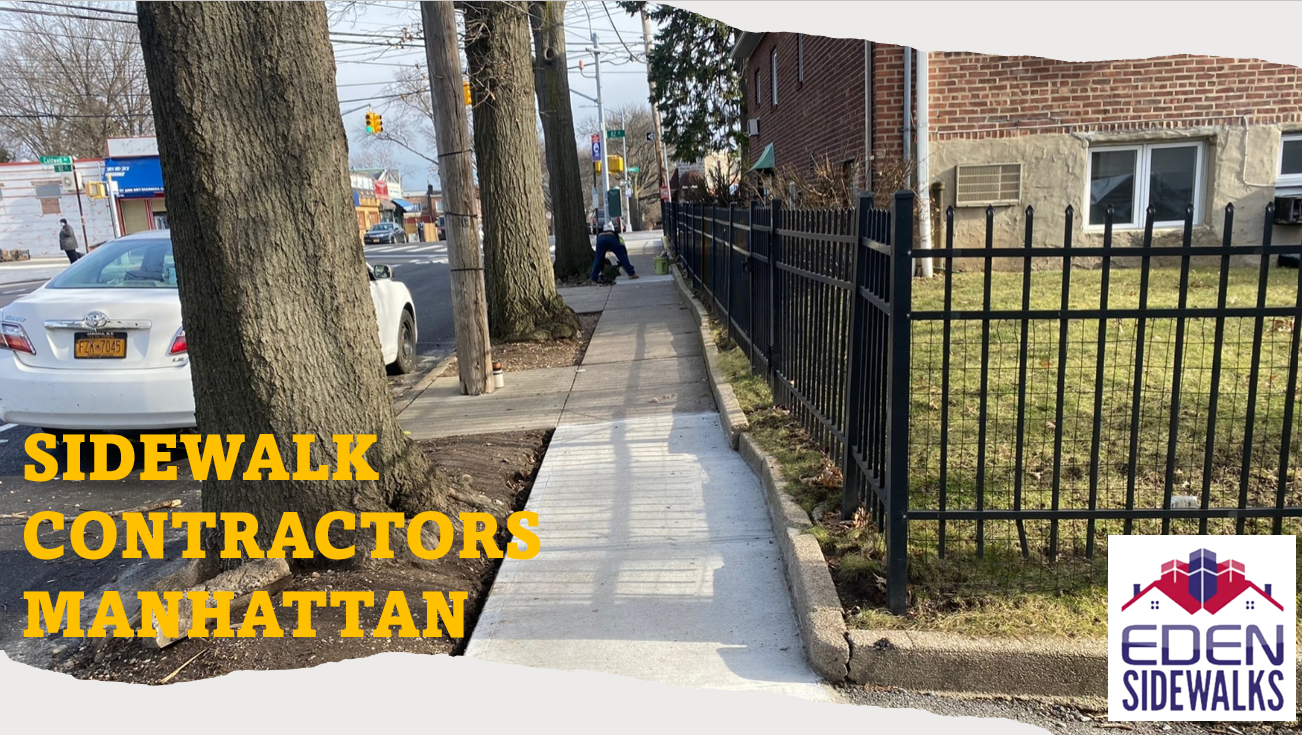
Sidewalk Repair Materials: Which Ones Are Best for Manhattan?

When it comes to repairing sidewalks in Manhattan, there are several materials to choose from. However, not all materials are created equal. Some may be more cost-effective, while others may offer better durability or aesthetic appeal. In this article, we will explore the various sidewalk repair Manhattan materials available and highlight the pros and cons of each.
Introduction
Manhattan's sidewalks are subject to heavy foot traffic and harsh weather conditions, which can lead to wear and tear over time. As a result, repairs are often necessary to maintain the safety and appearance of the city's sidewalks. The choice of material for sidewalk repairs is an important decision, as it can impact the longevity, cost, and aesthetic appeal of the sidewalk.
Concrete
Concrete is a popular choice for sidewalk repairs due to its durability and affordability. It is made from a mixture of cement, water, and aggregates such as sand and gravel. Concrete repair Manhattan can be poured into molds to create uniform slabs or stamped to create unique patterns.
Pros of Concrete
Cost-effective: Concrete is relatively inexpensive compared to other sidewalk repair materials.
Durable: Concrete can last for several decades with proper maintenance.
Versatile: Concrete can be poured or stamped into various shapes and patterns.
Slip-resistant: The texture of concrete provides good traction, reducing the risk of slips and falls.
Cons of Concrete
Prone to cracking: Concrete can crack over time due to weather conditions or heavy use.
Requires maintenance: Concrete may require regular maintenance, such as sealing or patching, to prevent further damage.
Limited aesthetic appeal: Plain concrete can be unappealing, and stamped concrete can fade over time.
Asphalt
Asphalt is a flexible pavement material made from a mixture of aggregates and asphalt binder. It is commonly used for roads and driveways, but can also be used for sidewalk repairs.
Pros of Asphalt
Quick installation: Asphalt can be installed quickly, reducing the amount of time that sidewalks are closed for repairs.
Cost-effective: Asphalt is typically less expensive than other sidewalk repair materials.
Easy to maintain: Asphalt can be easily patched or resurfaced as needed.
Flexible: Asphalt is more flexible than concrete, which can make it better suited to areas with high foot traffic.
Cons of Asphalt
Less durable: Asphalt is not as durable as concrete and may need to be replaced more frequently.
Limited aesthetic appeal: Plain black asphalt may not be visually appealing and may clash with the surrounding architecture.
Slippery when wet: Asphalt can become slippery when wet, increasing the risk of slips and falls.
Brick Pavers
Brick pavers are small, individual bricks that can be laid in various patterns to create a sidewalk. They are made from clay or concrete and can come in a range of colors and textures.
Pros of Brick Pavers
Aesthetic appeal: Brick pavers can add visual interest to a sidewalk and can be customized to match the surrounding architecture.
Easy to replace: If a section of brick pavers becomes damaged,
it can be easily replaced without affecting the rest of the sidewalk.
Durable: Brick pavers are durable and can last for decades with proper maintenance.
Slip-resistant: The texture of brick pavers provides good traction, reducing the risk of slips and falls.
Cons of Brick Pavers
Cost: Brick pavers can be more expensive than other sidewalk repair materials.
Time-consuming installation: Installing brick pavers can be time-consuming, as each brick must be laid individually.
Maintenance: Brick pavers may require regular maintenance, such as resealing or replacing individual bricks.
Natural Stone
Natural stone, such as granite or limestone, can be used for sidewalk repairs. It is durable and can provide a unique and visually appealing look.
Pros of Natural Stone
Aesthetic appeal: Natural stone can add a unique and visually appealing look to a sidewalk.
Durability: Natural stone is durable and can last for decades with proper maintenance.
Slip-resistant: The texture of natural stone provides good traction, reducing the risk of slips and falls.
Cons of Natural Stone
Cost: Natural stone can be more expensive than other sidewalk repair materials.
Limited availability: Natural stone may not be readily available in all areas.
Maintenance: Natural stone may require regular maintenance, such as resealing or replacing individual stones.
Polymer-Based Materials
Polymer-based materials, such as epoxy or polyurethane, can be used for sidewalk repairs. These materials are typically applied as a liquid and then harden into a solid material.
Pros of Polymer-Based Materials
Quick installation: Polymer-based materials can be installed quickly, reducing the amount of time that sidewalks are closed for repairs.
Durability: Polymer-based materials are durable and can last for several years.
Versatile: Polymer-based materials can be used for a range of repairs, from small cracks to larger areas of damage.
Cons of Polymer-Based Materials
Cost: Polymer-based materials can be more expensive than other sidewalk repair materials.
Limited aesthetic appeal: Polymer-based materials may not be visually appealing and may clash with the surrounding architecture.
Slippery when wet: Polymer-based materials can become slippery when wet, increasing the risk of slips and falls.
Which Material is Best for Manhattan?
The choice of material for sidewalk repairs in Manhattan will depend on several factors, such as the location of the sidewalk, the amount of foot traffic, and the surrounding architecture. Concrete and asphalt are the most common materials used for sidewalk repairs, as they are cost-effective and durable. Brick pavers and natural stone can provide a unique and visually appealing look, but they are more expensive and time-consuming to install. Polymer-based materials can be a good option for smaller repairs or areas that require quick fixes.
Hire Concrete Repair Contractors NYC.
Conclusion
Choosing the right material for sidewalk repairs in Manhattan is an important decision, as it can impact the safety, appearance, and longevity of the sidewalk. Concrete and asphalt are the most common materials used, but brick pavers, natural stone, and polymer-based materials are also options. Each material has its own pros and cons, and the choice will depend on the specific needs of the sidewalk.